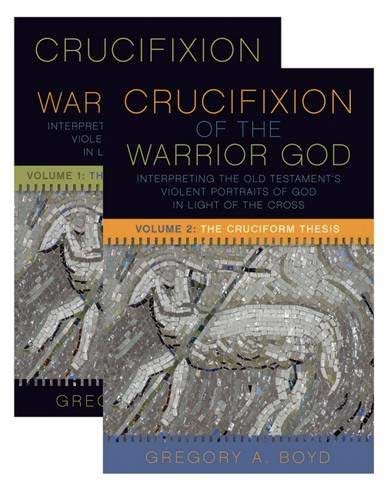We run our website the way we wished the whole internet worked: we provide high quality original content with no ads. We are funded solely by your direct support. Please consider supporting this project.

Renouncing Violent Appearances: CWG Excerpt
My ultimate hope for this two-volume work is that readers will acquire the cross-centered “Magic Eye” that allows them to discern the self-sacrificial, indiscriminately loving, nonviolent God revealed on the cross in the depths of the OT’s sometimes horrifically violent depictions of God. And in seeing this, my hope is that readers will see that the revelation of God on the cross must bring a once-and-for-all end to all of our own violent conceptions of him. Just as we renounce the sin and violence manifested on the surface appearance of the cross, even as we by faith discern God stooping out of love to break this sin and violence, so too, I contend, we should renounce the sin and violence manifested on the surface appearance of the OT’s violent depictions of him, even as we by faith discern God out of love stooping to bear this sin and violence. For when the sin of the world was nailed to the cross with Christ (Col 2:14), the sinful conception of God as a violent warrior god was included.
Hence, the revelation of the agape-loving and sin-bearing crucified God entails the permanent crucifixion of the violent warrior god.
Crucifixion of the Warrior God, Volume 1: The Cruciform Hermeneutic, pages xli-xlii
Category: General
Tags: Character of God, Crucifixion of the Warrior God
Related Reading

Crucifixion of the Warrior God Update
Well, I’m happy to announce that Crucifixion of the Warrior God is now available for pre-order on Amazon! Like many of you, I found that the clearer I got about the non-violent, self-sacrificial, enemy-embracing love of God revealed in Christ, the more disturbed I became over those portraits of God in the Old Testament that…

The Heavenly Missionary
In his second sermon introducing the ideas in Crucifixion of the Warrior God, Greg suggests a metaphor to help us frame the things we encounter in the Old Testament that seem at odds with the God we find in the life and death of Jesus. God is a heavenly missionary who stoops to accommodate our…

Cross Centered Q&A
For those within driving distance of Saint Paul, MN, we invite you to join us for a free event. Greg will be discussing his new book Crucifixion of the Warrior God with Bruxy Cavey (Pastor of The Meeting House in Toronto) and Dennis Edwards (Pastor of Sanctuary Covenant Church in Minneapolis). Don’t miss this opportunity to hear Greg…

The “Third Way”: Seeing God’s Beauty in the Depth of Scripture’s Violent Portraits of God
A publishing house recently sent me an advance copy of a book written by a well known scholar on the topic of the non-violent God revealed in Jesus, asking me to endorse it. (Publishing protocol stipulates that endorsers not critique a book before it’s released, so I will not mention the name of the author…

Podcast: Overflow Episode 1 — Dust, Flashlights, and Heathens
Dan and Brianna tackle some tough questions: —Is it okay for Christians to be cremated? —How can we preach from the OT with authority? —What should a Christian academic know in a secular school? http://traffic.libsyn.com/askgregboyd/Episode_0320_overflow_1.mp3

Does Paul Condone Vindictive Psalms? A Response to Paul Copan (#1)
In a recent paper delivered at the Evangelical Theological Society, Paul Copan raised a number of objections against my book, Crucifixion of the Warrior of God. This is the first of several blogs in which I will respond to this paper. (By the way, Paul and I had a friendly two-session debate on Justin Brierley’s…
